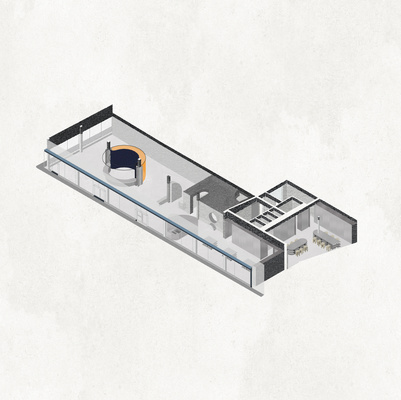Healing Product Design in a Neonatal Context
The project investigates how healing product design can be a beneficial contribution to the Danish Neonatal Intensive Care Units (NICU). With a strategic approach, the project presents a furniture that targets late consequences of being born prematurely, by stimulating the child’s motorical senses and increasing skin-to-skin contact with parents – easing the transition from the womb to the world.
Today the primary focus of the department is to treat the physical body as a machine that needs to be kept alive and functioning in the environment of the incubator. Looking at the child’s natural environment, the womb, we discovered the big differences between the incubator and the womb. The premature child is stimulated inappropriately as sharp lights and loud noises stresses the child at NICU. It lacks the physical and emotional connection to its parents and needs motorical stimulation during the time alone in the incubator.
The result of the project is a furniture that creates a calm space for parent and child as they continue their symbiotic connection through skin-to-skin contact. The furniture enables motorical stimulation of the child as an element of movement is built into the seat. Furthermore the furniture creates a degree of comfort that makes it possible for the parent to be the child’s primary environment during the day while replacing the incubator.
The project is developed through model experiments and with constant validation from interviews and observations from field and research. The complex context is approached from a strategic angle where informants and stakeholders are involved throughout the entire design process. It was an iterative process where findings and experiments conversed and fertilized each other.
As Strategic designers we believe that by designing a product which helps the premature children already at the NICU, the child and its parents will have fewer physical and psychological complications. The nurses will be given a product which adds to their existing practice and helps them to treat the child in a holistic way. Finally the government will benefit economically from both shortage of hospitalization days and a potential decrease in treatments of late consequences of the premature child.
Thanks to our network of dedicated key informants: Jonna Jepsen, Søren Eckhardt, Morten Breindahl and the staff at Rigshospitalet.
Thanks to our sponsors Københavns Listefabrik and Gabriel Textile. The prototype has been built in collaboration with carpenter Sophie Stasiak.

The project is a collaboration between Alexandra Rendtorff and Amalie Gielov.
We met each other in our master program Strategic Design & Entrepreneurship at The Royal Danish Academy of Fine Arts Schools of Architecture, Design and Conservation (KADK). A master developed and conducted in collaboration with Copenhagen Business School (CBS). Through fieldwork, design thinking and a deeper understanding of the strategic aspects of design we solve complex challenges that benefit humans.
Amalie Gielov (left) has a MA design in Strategic Design & Entrepreneurship and a background in industrial design.
Alexandra Rendtorff (right) has a MA design in Strategic Design & Entrepreneurship and a background in sustainable design engineering.
The differences in our backgrounds mean that we see the process from different angles which is one of our strengths when we work as a design duo.













